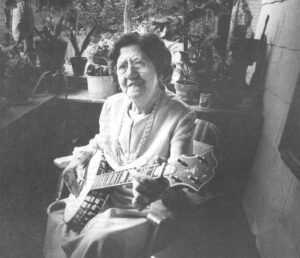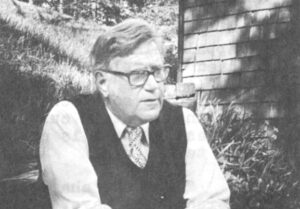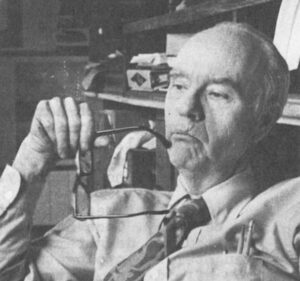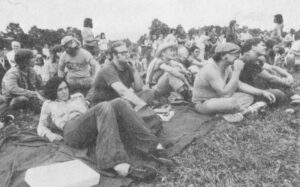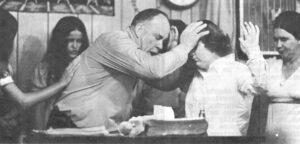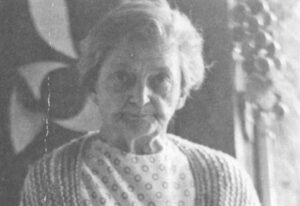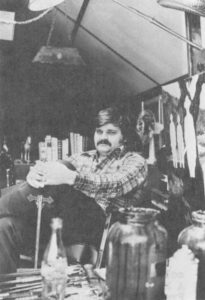James Domengeaux — Cajun by birth and preference — leaned back in his chair in his Lafayette, La., law office.
“After all,” he said, “isn’t this what America is all about? I mean freedom. Freedom to be a Cajun, to live the Cajun life without being ashamed of it. Without being forced into the mold that so much of America has been forced into. Why shouldn’t I be a Cajun if I want to be? And why shouldn’t I be relatively sure that no one, especially the government, is going to take any sanctions against me because of who I am?”
Domengeaux speaks of freedom in terms of being a Cajun. A thousand miles away, Jennie Wilson, a 76-year-old Appalachian spitfire, lives her Appalachian life on Crooked Creek, a former coal camp, now a “bedroom community” to the larger town of Logan.
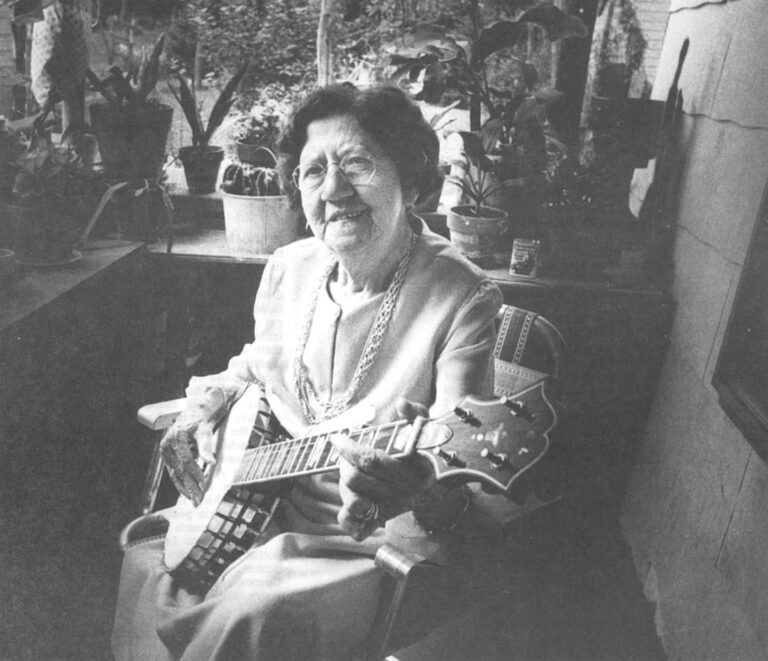
“I’m proud to be a hillbilly,” she says. “And I’m always ready to defend myself. I remember one time; some people from Ohio were putting us hillbillies down. Well, I got up and told them I believed Ohio was the buckeye state. And, I said, everyone knows a buckeye is a nut of no value.”
Jennie Wilson speaks of freedom in terms of being an Appalachian. But her freedom to be who she wants to be is hard won. And she must constantly be on guard against those who want to belittle her and her culture. So it is with Domengeaux who spends much of his time as chairman of the Council for the Development of French in Louisiana dispelling rumors and myths about the Cajun culture.
The Cajuns and mountain people of Appalachia are quite different in their attitudes and customs. But both are folk cultures struggling to survive. And while the people of Appalachia do not see the Cajuns as being in the same boat, and vice versa, the fact is both cultures are on their way to extinction. People in both cultures see old values being abandoned by the young who seek greener pastures outside their ancestral boundaries. Both cultures bear the burden of an identity crisis. Unable to cope with the fast pace of change, the people in the culture too often desert traditional ways for the current fashion. In doing so, they seem to forget the age-old truth that the cultures from which they sprang have sustained their numbers for centuries and, if the traditions are kept, there’s no indication the old values will fail them if they will but adhere to them.
The two folk cultures are changing, as they have in the past. A look at both the history of the Cajuns and the Appalachians shows that both cultures have bent to keep from breaking. But the fact remains the people are changing, faster than the cultures. Like lemmings rushing to the sea, most Cajuns and mountain people seem to enjoy the rat race as much as any others.
The southern Louisiana landscape is dotted today with modern, ranch-style homes, the result of a surge of affluence experienced in the last two years with the phenomenal rise in sugar and rice prices. Cajun farmers cashed in on the price hikes and many converted their cash into new homes. But, instead of keeping the traditional Cajun styles, most opted for the typical suburban home that can be found in any one of 10,000 places in America. The old high-peaked Cajun homes stand deserted. Many are used as barns and hay storage buildings. Soon, even their sturdy cypress beams will decay leaving little evidence that a once powerful culture had an influence on the architecture of the region.
In Appalachia, the story is the same. Family homesteads stand deserted in the harsh winter winds and blazing summer sun. In their place are modern suburban homes for the affluent and mobile homes for those who can find neither money for new homes or level land to build them on.
Mountain people are proven television addicts. Perhaps it’s the loneliness and isolation of living in the mountains. Whatever the reason, television has a profound impact on the lives of mountain people. At one of the numerous fundamentalist chapels scattered about the mountains, a woman recently stood before the congregation and asked for prayer for one of the afternoon soap opera heroines who found herself in the usual amount of trouble. To this Appalachian woman, television was reality. If, in fact, she connects soap operas with reality, what must the constant barrage of mass American culture she sees on the tube be doing to her value system? When she hears that “whiter-than-white” is the ultimate and sees that most people, as portrayed on television, spend 102 per cent of their time drinking coffee and cocktails and darting about the big city in one long round of garden parties, she must certainly see her life as one of deadly boredom, if not pathological catastrophe.
Because she receives little reinforcement about her cultural heritage, it’s easy for her to feel like she’s the last surviving cultural misfit in America. And in her attempt to be like what she perceives the outside world to be, the complexities of trying to be someone she isn’t often comes crashing down around her.
Cajuns seem less likely to be lured away from their heritage. Yet a strange phenomena is at work deep in Cajun country that produces a disproportionate number of suicides. Paul Tate, a Mamou attorney, noted that hardly a week passes that two or three suicides are not recorded within a 20-mile radius of Mamou. No known studies have been made of the phenomena, but some observers contend that perhaps the Cajuns’ inability to cope with modern America might be part of the problem.
Tate told the story of one of his clients. A typical Cajun, he said, she did not like to be financially indebted to anyone. After a serious and expensive operation, the money for the operation was slow in being delivered from her insurance company to the hospital. Instead of being patient and accepting the slowness of bureaucracy, she committed suicide.
Credit is the name of the game in America’s mass culture. Yet, the Cajun seems unable to contend with credit and indebtedness. Marriage and family problems seem to be on the rise in the Cajun region as well. The Cajuns are generally devout Catholics and yet they experience the same pressures that cause non-Catholics to separate and divorce. Since religion is such an integral part of the Cajun culture, “till death do us part,” is not only a religious dictum but a cultural statement as well.
Separation or divorce to a Cajun means not only pressure from the church, but pressure from the community. As a Cajun without a church and a cultural identity, the odds for any sort of happiness as a Cajun are slim indeed.
Few Cajuns and probably fewer Appalachians really know that their cultures are viable or even historic. Many probably feel that some fluke of nature or history threw them all together in one place to live as best they could. Few people in either culture realize that the cultures have evolved to meet the environmental and social needs of the people who call themselves Cajuns or Appalachians. That’s why it’s so easy for people in both cultures to leave their native regions in search of “something better.” In the case of Appalachians, many migrate to the industrial cities of the north, there to establish Appalachian enclaves, a little piece of mountain life being lived, as best it can, in the big city. The Cajuns haven’t formed these enclaves, not even in New Orleans, the closest big city. But the out-migration seems to have been less in Cajun country than in the mountains.
Perhaps the fadeout of the cultures is all part of a natural evolution. Perhaps there’s no other way. At least history proves that once a culture begins to fade, there seems to be little hope of bringing it to life again, except momentarily in historical pageants and literary efforts. But by taking this position, one must accept the premise that these cultures, which have sustained people for over two centuries cannot sustain them any longer. It is admitting that the traditional values found in the cultures cannot compete with the changing values of modern America.
But in this age of frenetic changes, there are those who believe folk cultures could provide a much-needed constant, a touchstone with the past, a portal to meaningful reality. They know there is need to hold onto the remnants of the cultures, but no one is sure just how.
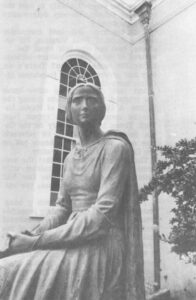
So, the folk cultures are brought to the classrooms of both regions. But too often, they are taught as historical subjects and the students get the uneasy feeling that the culture of their ancestors has no relevance to the present day. The folk cultures are celebrated in festivals and gatherings of all sorts, but the spectators get the feeling that what they are seeing is a re-enactment of some long-lost drama, which has no meaning for modern America.
People in both cultures are told to be proud of who they are. The past glories of the cultures are recounted and the people find it much easier to be proud of who they were than who they are now.
Stories are told again and again both among Cajuns and Appalachians of people who have made it big “out there.” Little, if any, praise is given to the people who have maintained the standards of their culture and have been happy, contented and even successful doing so.
Meanwhile, mass culture’s most effective weapon — mass media — continues its relentless conquest of the soul. Once, not too long ago, children listened to stories told by their parents and grandparents. Today, they rarely hear such stories. They’re too busy being lulled into mass culture complacency by “the tube” which brings shallow, meaningless stories that are lukewarm at best, poisonously mediocre at worst.
Once there was talk of a special educational television network for Appalachia, providing the special sort of education Appalachian children seem to need, all done in a way meant to uplift the culture rather than overwhelm it with middle class America. That idea has long since been buried just as a thousand other good ideas have been lost in government bureaucracy.
While some call for massive government aid to help the people in these folk cultures realize who they are, there are those who believe government has no right to interfere with the evolution of the cultures. One of these is Gov. Edwin Edwards of Louisiana. A Cajun by birth, he said in a recent interview with this reporter he does not believe government should meddle in the affairs of the culture. He is in favor of cultural education in the schools, but apparently not to the point that it would make young Cajuns militant in their attitudes.
In Appalachia, private and public agencies which have given money for cultural heritage programs all stop short of meeting the real issue of preserving the culture and what it might take to do the job. Money is spent primarily for programs dealing with the history of the culture. No one wants to touch the present or even speculate about the future. Perhaps the problem in Appalachia is wrapped up with the problems of colonization of the territory by outside interests and the plain fact that a revival of the Appalachian culture depends to some extent, on the people’s ability to own the land they inhabit, thereby determining their own destiny.
With big coal and land companies owning most of West Virginia, for example, how can one talk about the revival of Appalachian culture without facing the issue head on? There’s no way and government and foundation officials know this.
And just recently, the same issue has cropped up in Louisiana among the Cajuns. A Cajun resident of Bayou Lafourche complained in a recent New York Times Magazine story on the Cajun culture that outside oil interests now seem to be taking a heavy toll on the Cajun culture and its destiny.
Thus, it might be said that the economics, as much as mass culture, may determine the future of the two folk cultures. And in this context, the outlook is equally as bleak.
The cultures won’t die with a bang. Rather they will die in nearly inaudible whispers. One after another, cultural traits will disappear. The death of the last Cajun or last Appalachian will probably go unnoticed. But years after it happens, the golden ages of the two powerful cultures will be recalled again and again as the losses are mourned.
This is the final newsletter from Dave Peyton, an Alicia Patterson fellow on leave from the Huntington (W.Va.) Advertiser. During the last year, Peyton studied the Appalachian culture and the French-speaking culture of Louisiana in terms of how they are coping with 20th Century America and its mass culture. The newsletter may be reprinted with credit to Peyton as an Alicia Patterson Fellow. The views expressed are not necessarily those of The Alicia Patterson Foundation. Typesetting for this newsletter was courtesy of The Huntington Publishing Co., Huntington, W.Va.
Received in New York on June 24, 1976
©1976 Dave Peyton
Dave Peyton is an Alicia Patterson Foundation award winner on leave from The Huntington Advertiser (West Virginia). This article may be published with credit to Mr. Peyton, The Huntington Advertiser, and the Alicia Patterson Foundation.

